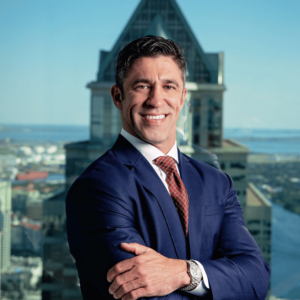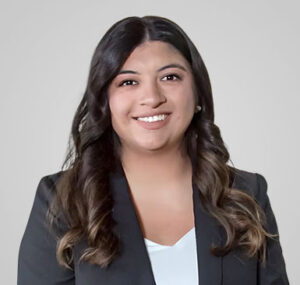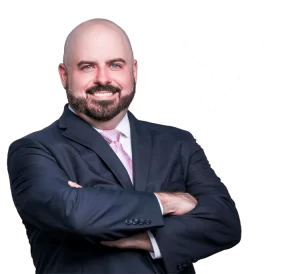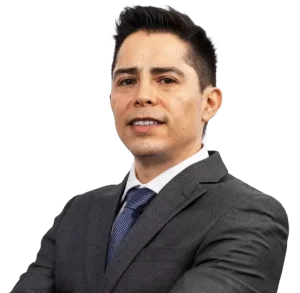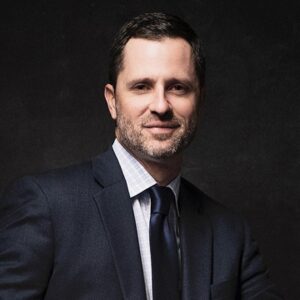Best Family Law Attorneys in Tampa
Best Family Lawyer in Tampa
Michael Altman
Family Lawyer
Mireya Lacayo, Esq.
Family Lawyer
Focusing solely on family law cases has helped me tailor my practice to efficiently aid families and individuals through challenging life changes. But if there is one group in particular I am always attentive to, it is the children involved in any divorce or family law conflict.
I founded The Family Law Office Of Tampa Bay with the belief that every client should have access to affordable, high-quality legal representation. Together, we can create a financial strategy that works well for you and your budget without sacrificing the quality of your representation.
Here at The Family Law Office Of Tampa Bay, it is my honor to help break down, step by step, the intimidating procedures and requirements of family law into manageable and understandable steps.
Each family is unique, which means that the law is applied individually in different ways for each case. Fortunately, you don’t have to feel stuck in a web of confusion – we’re here to help you understand exactly how the process will affect your family and guide you through how the law will apply to your specific set of circumstances.
Damien McKinney
Family Lawyer
Damien McKinney, founding partner of The McKinney Law Group, has dedicated his career to helping families through complex legal challenges. Born and raised in Florida’s Panhandle, Damien’s understanding of family dynamics is deeply rooted in his community ties. He brings nearly two decades of experience to his practice, focusing on marital and family law, including divorce, child support, custody disputes, and prenuptial agreements. Damien maintains law offices in both Asheville, North Carolina, and Tampa, Florida, offering comprehensive family law legal services.
Damien’s legal philosophy is focused on achieving amicable resolutions through negotiation and settlement, aiming to protect families and their assets without resorting to prolonged court battles. He believes in empowering his clients to make informed decisions, guiding them through the legal process with compassion and understanding.
Outside the courtroom, Damien is an avid outdoorsman and artist. He enjoys activities hiking, kayaking, and mountain biking. His artistic talents are showcased in local art festivals, reflecting his passion for community and cultural development.
Damien McKinney’s commitment to his clients and their families drives his practice. He is dedicated to providing thoughtful and effective legal strategies, ensuring every client feels supported and confident in their legal choices. Whether advocating in court or contributing to his community, Damien brings dedication and integrity to all aspects of his work.
Helbert Lopez
Family Lawyer
Helbert Lopez believes that helping to solve legal problems doesn’t just mean looking for solutions. It’s also about finding opportunities for clients to move ahead confidently with their lives following a divorce, an immigration matter, an auto accident, or a personal bankruptcy.
In his role as CEO of Florida Law Advisers, P.A., Helbert uses his broad range of legal savvy and business wisdom to give Tampa, Orlando, and Central Florida citizens the guidance they need.
“My diverse work experience and education provide a solid foundation to solve any issues faced by my clients,” Helbert proudly proclaims. “In these capacities, I have gathered a multitude of skills that will benefit my clients and my organization.”
A native of Colombia, Helbert points to his complex background in Florida real estate as an example. He says his fluency in Spanish allowed him to effectively communicate with buyers and sellers so that families could buy their first house.
Yet, Helbert realized that reaching his full entrepreneurial potential meant gaining a better understanding of law. He says that upon earning his law degree, he developed a professional acumen and a business model. This included knowing smart ways to purchase unclaimed real estate properties and enhancing his emerging real estate business.
With Florida Law Advisers, P.A., Helbert is using that same well-honed business sense to help the Latin American population in Central Florida with their legal needs. He says the law firm’s goal is to provide top-quality family law, personal injury, immigration, and bankruptcy/debt protection services — without steep legal fees or extensive time battling in court.
Jennifer Miller
Family Lawyer
Jennifer was born and raised in the Northeast, where she obtained an Associates of Arts degree in 2007. She moved to Florida in 2011. After moving to Florida she commenced working as a paralegal in 2012, and has worked for both large and small firms. Jennifer has been with the Law Office of Laura A. Olson, P.A. since November 2015, and quickly became an invaluable part of the firm’s legal support team.
Jennifer enjoys traveling, concerts, kayaking and hiking. Jennifer also is an animal enthusiast, is active in various dog rescue groups, and is the proud owner of two dogs. Additionally, and maybe most important, Jennifer just happens to be Henry’s (the office dog) most favorite person.
Lynette Silon-Laguna
Family Lawyer
Attorney Lynette Silon-Laguna founded in 1997 what is now known as All Family Law Group, P.A., a family law firm serving Tampa Bay with offices locations throughout Tampa Bay. The law firm practice encompasses a wide spectrum of family law matters, including, but not limited to, divorce, paternity, child support, child custody, post judgment modifications, stepparent adoption, relative adoption, name change and domestic violence, as well as criminal defense.
Ms. Silon-Laguna graduated Summa Cum Laude from the University of Central Florida with a Bachelor of Arts degree in Legal Studies. While in school, she was awarded Founder’s Day Honors and a Certificate for Outstanding Achievement and was elected to the Phi Kappa Phi honor society. Thereafter, she earned her Juris Doctorate law degree from the University of Florida Fredric G. Levin College of Law, where she graduated With Honors.
Since October 1995, Ms. Silon-Laguna is admitted to practice in all Florida state courts and the United States District Court for the Middle District of Florida. She is a member of the Family Law Sections of the Florida Bar and the Hillsborough Bar Association. She is also a member of the Tampa Bay Bankruptcy Bar Association. She has been awarded numerous memberships with top divorce, family and lawyer societies.
Robert D. Sparks
Family Lawyer
Robert Sparks and trial partner, Chris Codling, obtained the largest jury verdict in a pedestrian injury case in Hillsborough County history – an award of $30 million which was recognized as one of the largest verdicts in America in 2017. This record-setting verdict came on the heels of various other million dollar litigation and settlements, marking Robert as one of the youngest top trial attorneys in the nation to obtain such an accomplishment.
Millions Recovered for the Injured in Florida
As the lead trial attorney for the personal injury division, Robert has recovered millions of dollars on behalf of his clients for cases involving wrongful death, negligence, medical malpractice, truck and auto accidents, insurance disputes, and commercial litigation. Robert also leads a team of family law attorneys and staff in the litigation of all facets of matrimonial and family law cases, including the representation of celebrities, athletes, business leaders, and other local community leaders.
In response to his successful litigation practices, Robert is recognized among the top 1% of attorneys in the country by the Million Dollar Advocates Forum and is included on the lists of Super Lawyers, The National Lawyers Top 100 Trial Lawyers, The National Lawyers Top 40 Under 40, America’s Top 100 High Stakes Litigators, Expertise’s Best Personal Injury Lawyers in Tampa, Lawyers of Distinction and 10 Best Personal Injury Attorney by the American Institute of Personal Injury Attorneys.
Under Rob’s leadership, his team of personal injury trial attorneys has received recognition for Top Verdicts & Settlements by The National Law Journal (#62 Ming v. Gerelco Traffic Controls), Top Verdict’s Number 1 Verdicts in Florida (Brain Injury), Number 2 Verdicts in Florida (Pedestrian Accident), Top 20 Verdicts in Florida (#11), Top 10 Car Accident Verdicts in Florida, Top 10 Personal Injury Verdicts in Florida, and Top 10 Brain Injury Verdicts in Florida.
Robert consistently represents clients against insurance companies that wrongfully deny or underpay insurance claims. He works tirelessly for his clients and has been successful in helping families and businesses recover against the insurance giants who would have otherwise denied or refused to take responsibility for their actions. As a result of this track record, Robert is acknowledged as one of the best up and coming trial lawyers.
A Tampa native, Robert attended King High School and then Saint Leo University on a baseball scholarship. Following his collegiate career, Robert graduated from Nova Southeastern University, Shepard Broad Law Center where he was honored for trial advocacy. Robert is licensed to practice in Florida, the Supreme Court of Florida, and the Federal Middle District Court of Florida.
He and his wife Dana, along with their children, reside in the Tampa Bay area and are involved in various civic and athletic organizations as sponsors and donors, as well as their local church.
Jeanne T. Tate
Family Lawyer
Jeanne T. Tate is a Board Certified Adoption Attorney and started Jeanne T. Tate, P.A. in 1999. Jeanne has an extensive and exclusive practice in the area of adoptions and is a member of the prestigious Academy of Adoption and Reproduction Attorneys and the Florida Adoption Council.
For many years in a row, Jeanne has been named in The Best Lawyers in America, Florida’s Legal Elite, and Florida Super Lawyer, including as one of the top 100 lawyers in the State of Florida. Over her career, Jeanne has won several prestigious awards including the U.S. Congressional Angel in Adoption Award, the Tampa Chamber of Commerce’s Small Business Leader of the Year, the Florida Adoption Council’s Lifetime Achievement Award, the Hillsborough Association for Women Lawyers (HAWL) Achievement Award, the Tobias Simon Pro Bono Service Award (the highest statewide pro bono award given by the Florida Supreme Court) and inclusion in the Martindale-Hubbell Bar Register of Preeminent Women Lawyers. Jeanne has been appointed to serve on the Adoption Law Certification Committee, the Judicial Nominating Procedures Committee, the Thirteenth Judicial Circuit Court Nominating Committee (twice) and the Florida Supreme Court Judicial Nominating Commission (twice). Additionally, Jeanne has been an Adjunct Professor at the University of Florida College of Law where she taught Adoption Law and Procedure for six years.
Jeanne has appeared on local and national television on the subject of adoption, has been active in Interstate Compact Adoptions, and has been integrally involved in adoption issues before the Florida legislature.
Jeanne is rated AV Preeminent by Martindale-Hubbell, signifying that the legal community ranks her “at the highest level of professional excellence.”
Social Security Benefits for Children in Foster Care
Children in foster care often come from challenging backgrounds, and financial support can be crucial in meeting their needs. Social Security benefits are available to some children in foster care, providing much-needed assistance to help with their upbringing and well-being. These benefits can come from various programs under the Social Security Administration (SSA), including Supplemental Security Income (SSI) and benefits based on a parent’s Social Security earnings record. Here’s a breakdown of the key types of Social Security benefits and how they apply to children in foster care:
1. Types of Social Security Benefits for Foster Children
a. Supplemental Security Income (SSI)
- What Is SSI?: SSI is a program that provides financial assistance to disabled individuals with low income, including children. A child may be eligible for SSI if they have a qualifying disability and meet specific income and asset limitations. The child’s foster care status does not directly affect eligibility, but the financial resources of the foster family or state agency may be considered in determining the child’s eligibility.
- Disability Requirements: To qualify for SSI, a child must have a physical or mental impairment that significantly limits their ability to function and is expected to last for at least 12 months or result in death. Conditions such as developmental delays, mental health disorders, or physical disabilities can make a child eligible for SSI.
- How It Works: Once approved, SSI benefits are typically paid to the foster parent, legal guardian, or a representative payee, who is responsible for managing the money for the child’s care and needs.
b. Survivor Benefits
- What Are Survivor Benefits?: Children who have lost a parent may be eligible for Social Security survivor benefits based on the deceased parent’s work record. The parent must have paid into Social Security for a sufficient number of years to qualify.
- Eligibility: Foster children can receive survivor benefits if their biological or adoptive parent passed away and was eligible for Social Security. The child must be under the age of 18 (or up to age 19 if still in high school) to qualify. Children with disabilities may qualify for benefits beyond these age limits if the disability began before age 22.
- How It Works: The monthly benefit amount depends on the parent’s earnings and contributions to Social Security. The funds are typically paid to the child’s representative payee, who manages the money for the child’s needs.
c. Dependent Benefits (Based on a Parent’s Record)
- What Are Dependent Benefits?: If a child’s biological or adoptive parent is receiving Social Security retirement or disability benefits, the child may also be eligible for dependent benefits. These benefits are based on the parent’s earnings record.
- Eligibility: Foster children can receive dependent benefits if they are the biological or adoptive child of a parent receiving Social Security benefits. Like survivor benefits, children must generally be under the age of 18, or 19 if still in school, or have a disability that began before age 22.
- How It Works: The monthly benefit is based on a percentage of the parent’s Social Security benefit, with a cap on the total amount a family can receive. A representative payee, usually the foster parent or guardian, manages the funds for the child.
2. Who Receives the Benefits?
In most cases, Social Security benefits for children in foster care are paid to a representative payee. This is typically the foster parent, legal guardian, or the state agency responsible for the child. The representative payee is responsible for using the funds for the child’s basic needs, including food, clothing, shelter, medical care, and other essentials.
3. Special Considerations for Children in Foster Care
There are unique circumstances to consider when a foster child is receiving Social Security benefits:
State Care: In some cases, if a child is under the care of a state agency, the agency may apply to become the representative payee and manage the child’s benefits. This ensures that the funds are used to cover the cost of foster care.
Transitioning Out of Foster Care: When a child ages out of foster care, they may still be eligible for Social Security benefits, especially if they are receiving SSI or have a qualifying disability. The representative payee may need to change, or the child may become responsible for managing their own benefits if they are capable.
Foster Parent’s Role: Foster parents who receive Social Security benefits on behalf of a foster child are legally required to use the funds for the child’s needs. They must keep records of how the money is spent and may be required to submit an annual report to the SSA detailing how the benefits were used.
4. Applying for Social Security Benefits for Foster Children
To apply for Social Security benefits for a child in foster care, the following steps are generally involved:
Gather Necessary Documents: This includes the child’s birth certificate, Social Security number, medical records (if applying for SSI), and any documentation related to the child’s disability or the parent’s death or Social Security record.
Submit an Application: Applications for SSI benefits or dependent/survivor benefits can be submitted online through the Social Security Administration’s website or at a local Social Security office.
SSA Review: Once the application is submitted, the SSA will review the information to determine if the child is eligible for benefits. If additional documentation is needed, they will request it.
Receive a Decision: The SSA will notify the applicant of their decision. If approved, benefits will typically start within a few months, and payments will be made directly to the representative payee.
5. Appealing a Denied Application
If an application for Social Security benefits is denied, there is an appeal process. Foster parents, guardians, or state agencies can request a reconsideration or a hearing before an administrative law judge if they believe the child should be eligible for benefits.
Conclusion
Social Security benefits can provide vital financial support for children in foster care, helping to meet their basic needs and improve their quality of life. Whether through SSI for disabled children or dependent and survivor benefits based on a parent’s work record, these programs ensure that foster children receive the care and resources they need. Foster parents and guardians must understand the eligibility requirements, application process, and their responsibilities as representative payees to ensure that the benefits are used effectively for the child’s well-being.

